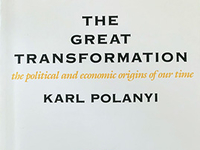With the exception of (orthodox) economics, social scientists – and in particular sociologists and social anthropologists – have long agreed that the pure competitive market is not humankind’s natural condition. From this consensus, they have launched countless defenses of state sovereignty in order to justify extended forms of state intervention. These efforts have been redoubled since the Global Financial Crisis (GFC) of 2008. In the aftermath of the GFC, which has been framed in terms of a crisis of sovereign debt and addressed via austerity measures, the advocacy of state action has taken one of two main forms: (i) a defense of Keynesian tenets and the evocation of macroeconomic interventions directed at stimulating economic growth; (ii) the promotion of a nostalgic account of the postwar welfare state, supporting calls for redistributive measures directed at attenuating social inequalities. These responses, widespread among progressives, fail on both conceptual and normative grounds. They fail to challenge – and indeed perpetuate – the by now generally accepted but unwarranted neoliberal claim that there is an inevitable trade-off between states and markets.
The state as champion of the market
The social and political history of the last two centuries does not support this zero-sum account of the relationship between the state and the market. Karl Polanyi’s The Great Transformation (first published in 1944) still offers the best theoretical account. Summarizing the critique of the classic social theory of liberal political economy, Polanyi argues that the laissez-faire policies designed to bring about a market society were the result of a political plan, whereas the social pressures supporting waves of protective regulation were a spontaneous reaction against the strains produced by those policies. In making the market an act of statecraft, Polanyi rejects the assumptions of political economic thinking more radically than do Marxist approaches. He views the state as both the initiator of the drive to establish a market economy and the champion called upon to rescue markets from the cyclical crises they tend to generate. Far from being the executive committee of the bourgeoisie, the state engages in market-making and -modifying for genuinely political reasons – to strengthen its sovereign power – and not because of the hegemony acquired by liberal or neoliberal ideas among political and technocratic elites.
How can markets help the state boost its sovereign power? The answer we derive from Polanyi’s account of change is that markets have the ability to undermine the cooperative relations underpinning communal life by making various subgroups compete against each other. As such, markets represent a soft-power alternative to military and repressive force. They undermine the internal coherence and normative autonomy of communities, leaving state actors free to overcome social opposition to top-down attempts to impose a centralized, bureaucratic will. The battle against feudal authorities, intermediary bodies, professional associations, and guilds initiated by the absolutist state and continued by liberal states had this as its primary objective. The interest shown by Soviet apparatchiks in market socialism, and the embracing of the neoliberal market by the Chinese Communist Party also reflect this logic. Nor should we overlook the ways in which the market pattern has been selectively and strategically deployed to undermine those communities and groups that have actively resisted the state’s bureaucratic encroachment. Unlike Marx (and his followers), Polanyi’s critique of markets is not concerned with the question of workers’ exploitation and/or alienation, but with its anomic outcomes: the erosion of groups’ ability to regulate social intercourse and to maintain normative cohesion.
A colonial logic
In pursuing this centralizing drive, state authorities apply a colonial logic both at the domestic level (to subjugate indigenous communities and internal enemies) and at the international level (to impose the dominion of the state upon foreign territories and populations). Viewed historically, these two activities are intimately connected. External expansion has been the main means through which the state has been able to dampen the mounting internal social conflicts generated by market reforms – the so-called “social question.” The similarity between internal and external forms of colonization can also be seen in the cooperative relations that state authorities establish with other societal actors. At the domestic level, the process of consolidation of the state has required the formation of collusive coalitions with various social and economic elites willing to share both burdens and benefits. Likewise, at the international level, colonial powers have always relied on the support of compliant ethnic groups or social elites with whom they have shared the spoils of the colonial enterprise. In both cases, the collusive coalitions thus established have a competitive nature, forcing their members to periodically renegotiate the terms of the partnership in self-serving ways. Economic and political crises have thus represented opportunities to shift responsibility onto other partners and to regenerate the market system, producing the cycles of regulation and deregulation described by Polanyi.
Reconnecting the social and the political
In light of this complex strategic context and the interdependence of states and markets, an emphasis upon state sovereignty and calls for more state and less market are not simply naïve, but perverse. Social support for state action is in fact systematically employed to pass emergency measures that boost the bargaining power of state actors in the process of renegotiating the coalition they are part of. Similarly, fears about sovereign currency default, tax hikes, and flights of capital are exploited to strengthen the hand of the monopolistic economic forces and social elites seated at the bargaining table. The last decade epitomizes the moves and countermoves made by the members of the collusive coalition responsible for the establishment of the neoliberal consensus undermined by the GFC. To avoid repeating previous mistakes, we need solutions that go beyond the advocacy of welfare measures directed at protecting the poor. The social question has to be reconnected with a political one: the democratization of both markets and government. Polanyi’s appeal to social rights and to industrial democracy was an acknowledgement of such a necessity. But a broadening of democracy with the aim of empowering citizens would now have to be extended beyond the context of employment to include – among other things – extended consumer rights, legally enshrined limits on surveillance (both state and corporate), measures to constrain real estate and financial speculation, and the refocusing of questions of the environment, nature, and natural resources away from narrow economic interests towards responsibility vis-à-vis future generations. The alternative is to live with the current and future economic, political, and social consequences of a failing neoliberal utopia.
Antonino Palumbo, Palermo University, Italy <antonino.palumbo@unipa.it>
Alan Scott, University of New England, Australia and member of ISA Research Committee on Sociology of Urban and Regional Development (RC21) <ascott39@une.edu.au>






















